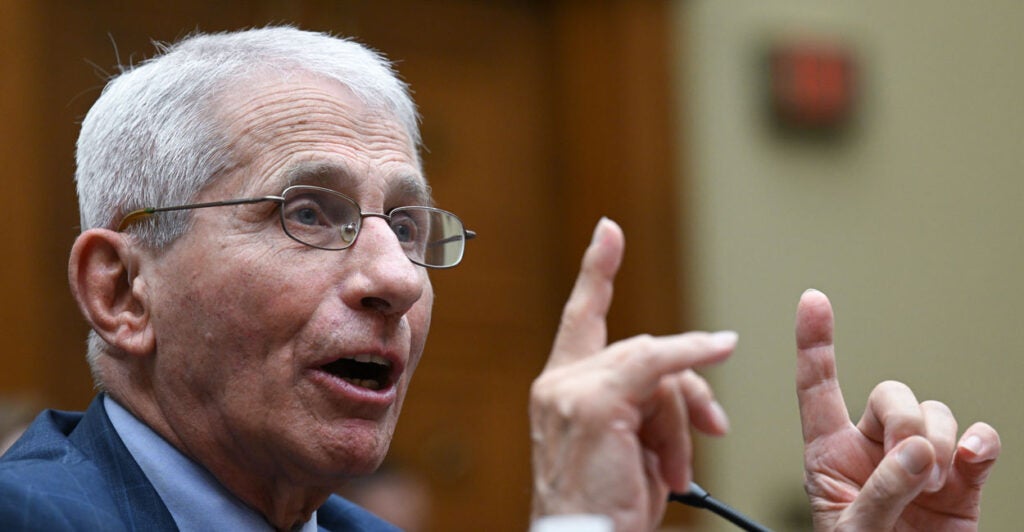All eyes were on Dr. Anthony Fauci when he testified last month under oath before the House Select Subcommittee on the Coronavirus Pandemic.
Praising him for his leadership, Democrats labeled the former director of the National Institute of Allergy and Infectious Diseases as the victim. Rep. Kathy Castor, D-Fla., for example, accused Republicans of wasting “significant time and taxpayer money fueling conspiracy theories.”
To their credit, House Republicans, with a few exceptions, focused on the facts.
The subcommittee, chaired by Rep. Brad Wenstrup, R-Ohio, uncovered several issues at the National Institutes of Health (the Institute of Allergy and Infectious Diseases is part of the NIH), including a lack of transparency, a flawed grant approval process, and a conflict of interest in protecting EcoHealth Alliance, the controversial firm that subcontracted NIH-funded gain-of-function research at China’s Wuhan Institute of Virology.
Many suspect that this type of research, enhancing the transmissibility and severity of the coronavirus pathogen, contributed to the initial COVID-19 spread and its impact.
Beyond these specific issues, however, an even more serious problem has emerged: the American people’s lack of trust in our public health and scientific institutions—a reality that is expected to persist for decades to come.
According to a recent survey, 70% of respondents believed that scientists will not publish findings if the results contradict the interests of the organization funding the study, and a mere 42% of respondents believed that scientists can overcome their human and political biases.
The public has a valid reason to feel this way, given that the subcommittee’s findings are consistent with their sentiments.
In hindsight, during the pandemic, federal public health officials contributed more to the public’s loss of trust in them than the “unvaccinated” individuals these officials often blamed for not “following the science.”
Early in the pandemic, Fauci initially deemed masks unnecessary then later supported mandating them. However, he admitted during the hearing that there was “no study that did masks on kids” nor was there a “control trial” that the Centers for Disease Control and Prevention used to justify its 6-foot social distancing rule.
In fact, this past January, Fauci conceded in closed-door testimony to the subcommittee that this 6-foot rule “sort of just appeared.”
Regarding Fauci’s relationship with the CDC, Rep. John Joyce, R-Pa., a fellow physician on the subcommittee, asked, “Once we realized that the virus was not spread by droplets and was aerosolized, did you feel an indication to go back to the CDC and say, ‘Let’s base this on science’… and ‘get rid of this 6-foot rule’?”
In response to Joyce’s questioning, Fauci responded that it is “not appropriate to be publicly challenging a sister organization.” Science, in other words, must take a back seat to bureaucratic politeness.
Given this mixed messaging and lack of transparency, Americans are right to be conflicted about whom to trust.
Unfortunately, these practices continued in regard to the COVID-19 vaccine.
The messaging about the vaccine’s effectiveness in preventing transmission and the duration of that protection was unclear. Fauci, during the June hearing, conceded that the protection “waned rather rapidly.” Yet in 2021 the vaccine was mandated in various sectors, including schools, health care, the federal workforce, and the military.
There were many sound reasons for popular pushbacks against these mandates, but the most notable concern was that the government inserted itself in the relationship between physicians and their patients.
Rep. Rich McCormick, R-Ga., a physician who treated COVID-19 patients, stated, “I watched as public health officials and politicians told my patients what treatment options were best for them regardless of their comorbidities or their medical history.”
Consequently, he said his opinions on mandates were relegated to “conspiracy and misinformation by so-called ‘health care experts’ who had never treated a patient throughout the entire pandemic.”
Furthermore, McCormick played a recording of Fauci stating that making people’s lives difficult leads them to “lose their ideological bulls–t” and get vaccinated. Consequently, increased political polarization, decreased public trust in lifesaving vaccines, erosion of social well-being, and compromised doctor-patient relationships have been among the many lingering negative results of these policies.
Throughout the pandemic, Fauci and colleagues who sided with him often touted that they were just “following the science,” but based on the unfolding record revealed under oath to the subcommittee by several witnesses, they followed the politics.
To his credit, Fauci finally acknowledged mistakes made at the federal level. For one, he said he recognized the need to “reevaluate” prior mandates that removed the notion of informed consent and contributed to a rise in vaccine hesitancy. Additionally, he acknowledged that to bring more clarity to the public, the CDC must do better to address the “lack of communication and interaction between the federal response and local public health officials.”
Given these revelations, public health officials must be willing to candidly admit when they are uncertain or quickly admit when the government makes mistakes. Just as they used their platforms to encourage vaccination, they must also utilize their influence to call out any inconsistencies or missteps.
Science is not and should never be represented by a single individual, a group of bureaucrats, or a powerful institution. It is rather the dynamic product of uncensored, open-minded discussion among a diverse community of informed professionals and educated researchers looking at the facts.
Finally, science must be pursued in an environment of transparency. The best data should drive public policy, and such a commitment to scientific integrity can purge the partisanship of public health.
Fauci’s recent testimony before Congress was a tonic. He revealed under oath some key federal policy failures during his tenure. In preparing for the next national health emergency, public health officials should pursue a path of transparency and facts rather than blunt edicts and fear. That is the only appropriate approach for the citizens of a free society.
